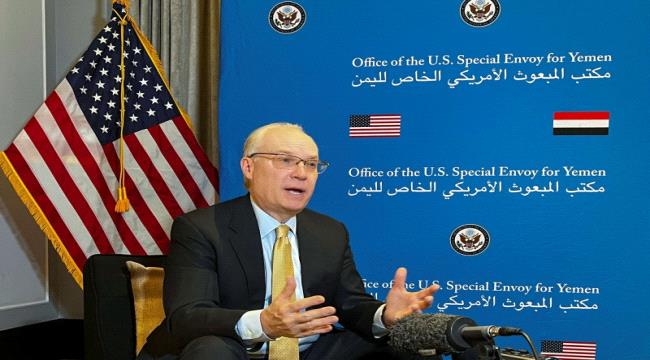The U.S. envoy to Yemen, Tim Lenderking, has reiterated his country's persistence in obstructing fair peace efforts and continuing attempts to bypass the declared solution parameters. In doing so, he promotes mercenaries as a primary party in the negotiation process instead of the countries responsible for the aggression. This comes as Sana'a has already declared its rejection of such a stance and warned the aggressive countries of the consequences of adhering to it.
In recent statements to the Saudi newspaper "Al-Sharq Al-Awsat," Lenderking said that the United States believes that many core issues, such as resource allocation, can only be resolved through a Yemeni-Yemeni political process. This statement serves as a clear confirmation of the U.S.'s continued push to refuse to pay state employee salaries from oil and gas revenues, a commitment that Sana'a includes as a basic condition for the aggressive coalition to work towards real peace.
Lenderking also claimed that his country believes that the humanitarian crisis in Yemen can only be resolved through negotiations between Yemeni parties. He confirmed that the White House supports the so-called Presidential Leadership Council affiliated with the mercenaries to "develop a vision for Yemen's future." This further emphasizes the continued linkage between humanitarian and political-military issues and the ongoing effort to push mercenaries to the forefront of the negotiation scene as the primary party, instead of the aggressive countries.
Through talks of negotiations between Yemeni parties, the United States seeks to obscure the role of the aggressive countries and perpetuate the falsehood of a "civil war." This allows Washington and Riyadh to appear as peace mediators while evading responsibility for war crimes committed against Yemenis and actual peace commitments, such as ending aggression, lifting the blockade, ending occupation, and paying compensation.
These statements represent a negative indicator that threatens the optimistic atmosphere created by the recent negotiation efforts hosted by the capital Sana'a during Ramadan, with the presence of Omani mediation. Returning to the extortion of the humanitarian file and continuing to evade commitments could lead to the complete failure of negotiations if Saudi Arabia succumbs to American desires.
These statements place the Saudi regime in a position where it must urgently respond to the declared peace parameters set forth by the national revolutionary and political leadership. This is necessary to prevent the clear U.S. attempts to drag Riyadh into continuing aggression and blockade, particularly in light of recurring military and political warnings from Sana'a regarding the consequences of such actions.







